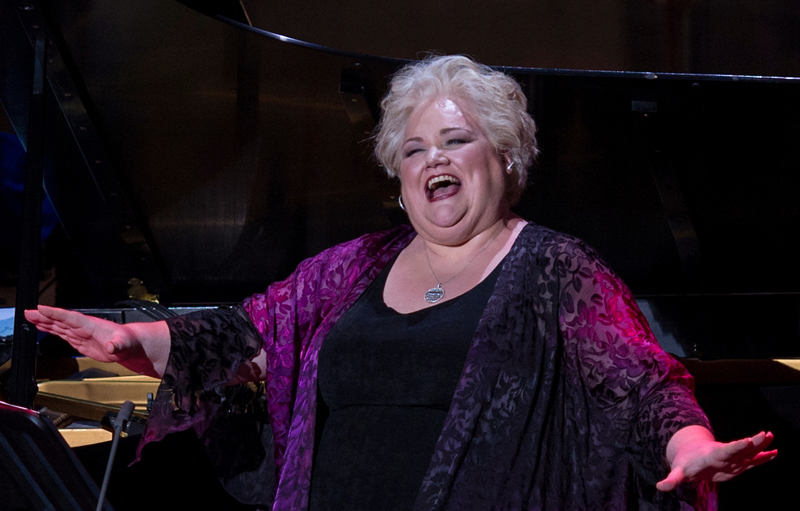Blythe’s Wagnerian presence and personality prevail at Carnegie

Stephanie Blythe performed a recital with pianist Warren Jones Friday night at Carnegie Hall. File photo: Kevin Yatarola
Stephanie Blythe was not in her best voice for her recital with Warren Jones at Carnegie Hall on Friday night. Her pitch was often iffy and her tone was strident in her upper register.
There was so much more, though, to this performance than technical gleam. Blythe’s voice, one of the most powerful vocal instruments around, is only a part of the experience of hearing her–another part, and the one that won out on Friday, is one of the biggest, most generous stage personalities known to the world of art music.
A case in point was the set that began the second half, Britten’s four Cabaret Songs to texts by Auden. Jones stumbled a bit over the racing piano part in “Calypso,” but Blythe made clear comedy of the song. “Tell Me the Truth About Love,” a cheeky Cole Porter sendup, sparkled with wit, as Blythe relished the silly sentimentality of both music and lyrics.
Now, not all of Blythe’s selections were so successful. A number of the French selections that made up the first half landed flat, as the American mezzo was unable to channel their intimacy into the spacious auditorium. This was most pronounced in Poulenc’s Poèmes de Ronsard. Even as Blythe found deep meaning in each of the songs, one couldn’t escape the feeling that the pieces themselves were too small for the venue.
Two songs by Léo Ferré, a composer of chanson little known on this side of the Atlantic, were stronger. In “La vie antérieure” she allowed her shimmering voice simply to float into the hall, and each refrain of “Luxe, calme, et volupté” in “L’invitation au voyage” landed with serene bliss. Jones wove a spell on the piano, making the most out of the uncomplicated accompaniment.
For the earlier songs, Blythe and Jones opted to read translations of the texts (or the text itself, in the case of the Britten songs) rather than having text booklets in the programs. This approach of course wouldn’t work for performers who are shy about speaking on stage, but it keeps the audience from staring into their laps and leafing through the program. And on Friday, these readings became a part of the performance in their own right, showing the two musicians’ personalities from another angle. Jones has a hint of Donald Swann’s unassuming cheerfulness, grinning and bobbing his head playfully at the piano, but when called on to read he composed himself with affecting earnestness.
Blythe, meanwhile, declaimed as though reciting sonnets at the globe, earning a smattering of applause for her reading of Jacques Brel’s “Amsterdam.” When sung, too, this song landed powerfully–she dug into it with grim determination, giving it not so much an arc as inexorable forward progress. As the song progressed, Blythe’s intensity grew, showing the power and dark color of her voice. “Ne me quitte pas,” for contrast, was practically whispered into the hall.
It came as no great surprise that the strongest part of Blythe’s program was her final set, five songs by Noël (Or rather Nöel, according to the Playbill) Coward. She and Jones wisely chose not to pre-read the texts for these numbers; Coward’s wit is tied not just in his music or in his lyrics, but in the way that the two interact, the spry humor flowing seamlessly out of the music. To try to give one without the other would be unedifying.
Blythe charmingly dispatched the twisting flair of “Nina” and brought twirling elegance to the waltz “Zigeuner.” Her rendition of “Mad About the Boy” was entirely her own–there was plenty of smoke, but it didn’t have quite the sultry allure of the famous recordings by Helen Forrest and Dinah Washington. This was an introspective, almost quiet performance.
A big-hearted, hilarious rendition of “Mrs. Worthington” set the audience roaring with laughter. It seemed Blythe, who had no qualms about addressing her audience directly throughout the recital, was willing to have a little fun at her own expense in this number, imploring a would-be stage mom not to let her very loud and very large daughter become an actress. Easy, calming cheer wrapped up the program in the lilting classic “The Party’s Over Now.”
But of course it wasn’t–the party continued with two encores, first the goofy “Singin’ in the Bathtub” from The Show of Shows, which Blythe said in her introduction she had chosen because it was such a hit at her last Carnegie recital with Jones. Finally, they concluded with a lovely, sincere account of “Always” by Irving Berlin, including some audience participation, which will be a key component of Blythe’s “Sing, America!” concert at Carnegie Hall next year.
